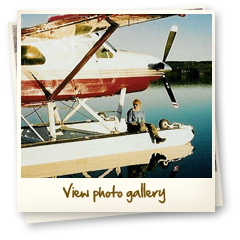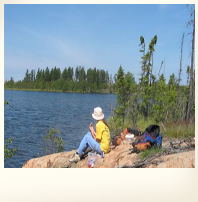

Kate MacLachlan is a Precambrian Project Geologist with Saskatchewan Ministry of Energy and Resources, Northern Geological Survey. She undertakes field work in the Canadian Shield of northern Saskatchewan as part of her research to support the mineral exploration industry in the province. Kate graduated with a B.Sc. Honours in geology from McGill University (1989) and then went on to complete an M.Sc. (Queen's University 1993) and a Ph.D. (Memorial University of Newfoundland 1998), both in geology. Following her Ph.D. Kate worked as a Post Doctoral Fellow and Research Scientist in the geochronology laboratory at the Geological Survey of Canada. Much of her research over the years has been focused in the far north of Canada including both Nunavut and NWT. Kate lives in Regina, Saskatchewan with her husband Ken and is currently the president of the Saskatchewan Geological Society.
 Q: What is the title of your job and what do you do?
Q: What is the title of your job and what do you do?A: I am a Precambrian project geologist with the Saskatchewan Ministry of Energy and Resources. My job is to do research on the geology of the Precambrian shield in northern Saskatchewan to enhance the opportunities for mineral exploration. This job typically involves 2-3 months of field work, commonly in a remote setting in northern Saskatchewan. This work is undertaken during the summer months. The rest of the year is spent analysing and processing the data that is collected in the field. This involves making geological maps, writing reports and giving presentations to the public and exploration industry personnel.
A: I work for the Saskatchewan Government in the Ministry of Energy and Resources, Northern Geological Survey. I am based in Regina, Saskatchewan.
A: When in the field we work 7 days a week and daily routines vary depending on things like the weather. Some days you may be stuck in your tent all day by heavy rain. Other days you may be out hiking and looking at rocks from 8 am to 6:30 pm. During the remainder of the year we work regular office hours, 8 am to 5 pm, five days a week.
A: In the summer I work in the field in remote settings in northern Saskatchewan. The rest of the year I work in the office in Regina.
A: For our field work we commonly operate out of remote tent camps services by float planes. Our power is supplied by small portable generators and we use propane appliances. We use hand held computers and GPS units for data collection and navigation. We commonly use small boats (typically inflatable) for day to day transportation around the field area. We may also use specialized hand held analytical instruments for measuring things like magnetic susceptibility or radioactivity. Office work is largely done using computers both for reports and map production, which is all digital.
 Q: What education or training is required for your job?
Q: What education or training is required for your job? A: Generally a master's degree in Earth sciences is required for this type of position, but in some cases this can be obtained during the initial period of employment. Field experience is also generally required and is commonly obtained through summer jobs and graduate studies.
A: For a field geologist a sense of adventure and a love of the outdoors are essential. You also need to be flexible and work well with others. Working in a remote setting with a small group of people for several months at a time requires team work and can sometimes be challenging for interpersonal relationships.
A: The salary range for my job is approximately $60,000 to $80,000/yr.

A: The field work! I really love to work outdoors in the summer and enjoy the intellectual challenge of geological mapping. I also enjoy getting to know the members of my field crew who are typically university students that are studying earth sciences.
A: Working out doors in the summer and keeping fit are definite advantages. This type of job also offers an opportunity to travel and see remote parts of the Province (or country if you work for the federal government) that many people never get to see. Government jobs have good benefits and job security relative to exploration companies.
A: You can progress from a junior project geologist right after graduate school to a senior project geologist position as you gain experience. From there, there is also an opportunity to move into management positions.
 Q: How physically demanding is your job?
Q: How physically demanding is your job? A: The summer field work is physically and mentally demanding and requires that you keep fit all year long so as to minimize potential for injury during the field season.
A: I chose this career because I thought rocks were very interesting and I liked the idea of travelling and working outside in the summer.
A: Both of my first two summers of field experience as a student were fabulous, but quite different in some ways. The first summer was in a very remote location in central BC, where I worked for a graduate student doing her Ph.D. It was just the two of us all summer and we back packed our camp from one location to another. It was a very beautiful area and a great adventure. The second summer was in even more spectacular scenery on northern Ellesmere Island in the Canadian arctic. It was a much bigger project led by the federal government and we had a large sophisticated camp with regular supply flights. We went out to work every day in a helicopter.
A: Make sure you enjoy what you do. There are many diverse opportunities in Earth science. Although it is what I love and what drew me to Earth sciences, remote field work is not for everyone. Another aspect which I was involved with during my postgraduate work was in the laboratory. There are lots of high-tech Earth science related labs across the country, if this is more your thing.